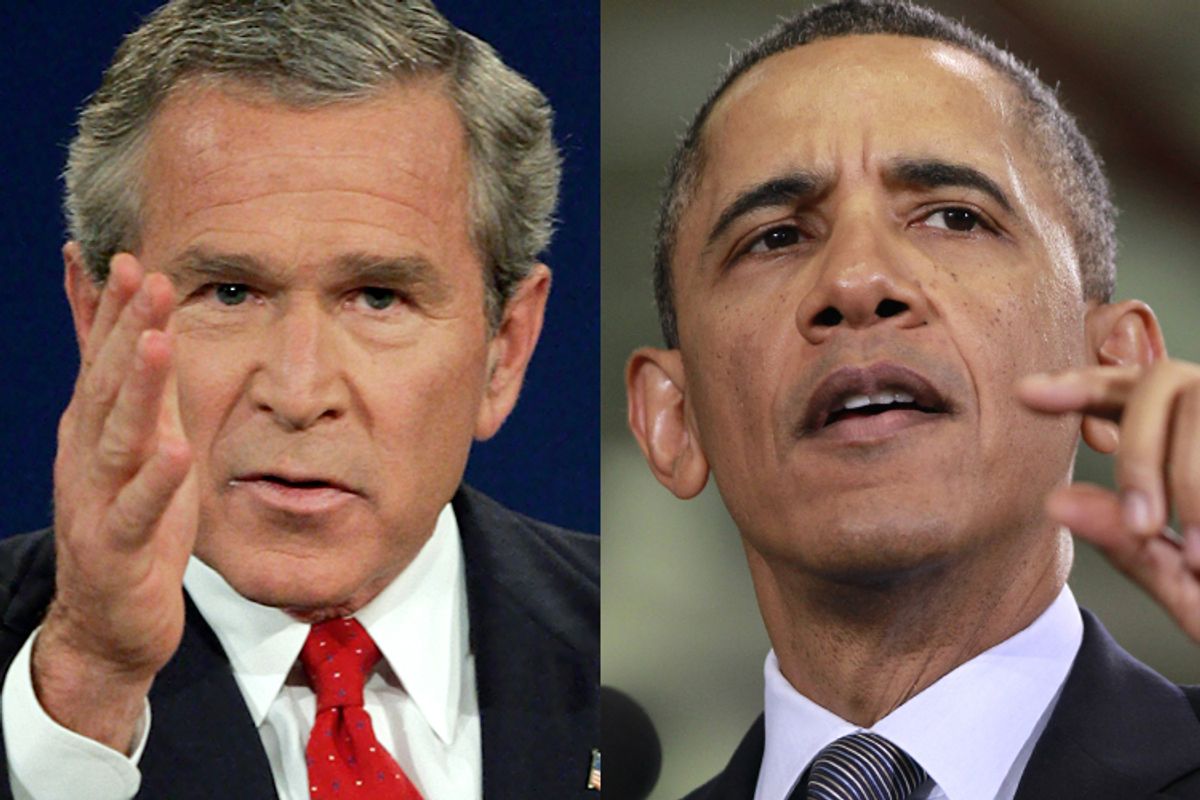A presidential order that governs the bulk of the NSA's spying (and a good deal of other agencies' spying), Executive Order 12333 has gotten a lot of attention lately. In July, a former State Department official, John Napier Tye, laid out how the order can be abused to permit the government to spy on Americans' communications collected overseas. More recently, coverage of document
In addition to describing the structure of the intelligence community and prohibiting assassinations, the EO lays out some limits on the spying intelligence agencies can do on Americans.
But there's something missing from this recent discussion. Indeed, it is missing even from the government's response to ACLU's FOIA, even though it probably shouldn't be.
On December 7, 2007, Senator Sheldon Whitehouse took to the Senate floor to read out language he got declassified from DOJ Office of Legal Counsel opinions that had authorized President Bush's illegal wiretap program. "An executive order cannot limit a President," Whitehouse read from his declassified language. "There is no constitutional requirement for a President to issue a new executive order whenever he wishes to depart from the terms of a previous executive order. Rather than violate an executive order, the President has instead modified or waived it."
In short, if the President does something (or orders something done) that is prohibited by his own Executive Order, no biggie. He can do that if he wants. Without even changing the language in the order!
Whitehouse used the example of the Protect America Act -- the predecessor to the FISA Amendments Act that authorizes the PRISM program (which was, at that moment, being challenged on precisely these terms by Yahoo) -- to explain what this meant. Under PAA, only language in EO 12333 protected Americans traveling overseas from being wiretapped. And because -- given that OLC precedent -- EO 12333 couldn't bind the President, Whitehouse explained, "here is what legally prevents this President from wiretapping Americans traveling abroad at will: nothing. Nothing."
That's a big part of the reason Congress included two provisions in the FISA Amendments Act preventing the government from targeting Americans' data overseas. Because without explicit law preventing an intelligence practice, the President can just claim the authority to engage in that practice, in secret, whenever he wants.
(Mind you, because the government claims it doesn't have to give notice to defendants identified using EO 12333 collection, it would be almost impossible for someone to catch the government breaking these laws in any case.)
EO 12333 is the only thing protecting Americans' privacy interests in data collected "incidentally" overseas -- along with all the other bulk data the government collects. So when the government points to EO 12333 when it claims it gets rid of US person data after 5 years, when it promises it "minimizes" Americans' data if it disseminates it, when it says the government can't search on Americans' names or email addresses? You've got no guarantee, besides an Executive Order the executive branch once decided in secret the executive branch didn't have to modify if it decided to ignore it.
As noted, this language -- declassified 7 years ago -- doesn't appear in any of the 3 DOJ OLC documents released to ACLU (there's a possibility it is redacted in one of two memos pertaining to the illegal wiretap program). Nor does the principle appear in the descriptions of the memos from that period that have been withdrawn or which DOJ no longer relies on. OLC was still publicly defending the opinion in 2008.
So unless that language has been secretly withdrawn, it should appear in ACLU's FOIA (indeed, one of the memos ACLU got has been superseded, suggesting it should appear in any case).
While DOJ might be playing word games with the wording of ACLU's FOIA request -- claiming that the President is not an agency and therefore language permitting him to change the rules affecting all agencies in secret doesn't amount to interpreting "the authority of...executive agencies under Executive Order 12,333."
DOJ has made similarly ridiculous arguments in FOIA responses before.
But all the agencies' interpretations of EO 12333 in government won't represent reality so long as DOJ hides the way this structure is built on the assumption (that relies, in turn, on a precedent from the Iran-Contra scandal) that the President can always change everything about EO 12333 guidelines without revealing that publicly.
ACLU National Security Project Attorney Patrick Toomey, who is litigating the FOIA, notes the way this undermines even the meager protections provided to Americans under EO 12333. "It is extremely troubling that the government believes that even the weak protections for Americans’ privacy written into Executive Order 12,333 can be overridden at the president’s say-so," Toomey warned. "The opinions illustrate just how few constraints Executive Order 12,333 actually places on the government, and how easily those rules can be changed unilaterally and behind closed doors.”
The problem with EO 12333, then, is two-fold.
The protections, as written, are not adequate to protect Americans' privacy, particularly given changes in technology and the government's use of bulk collection. But even the protections that exist may secretly be -- and have been, apparently, in the past -- changed with no notice.
Whether or not OLC still stands by this language, its precedent should underscore all discussions about EO 12333 as "protection." Because the order itself is like pixie dust: it can be disappeared at will, without any of us knowing.

Shares